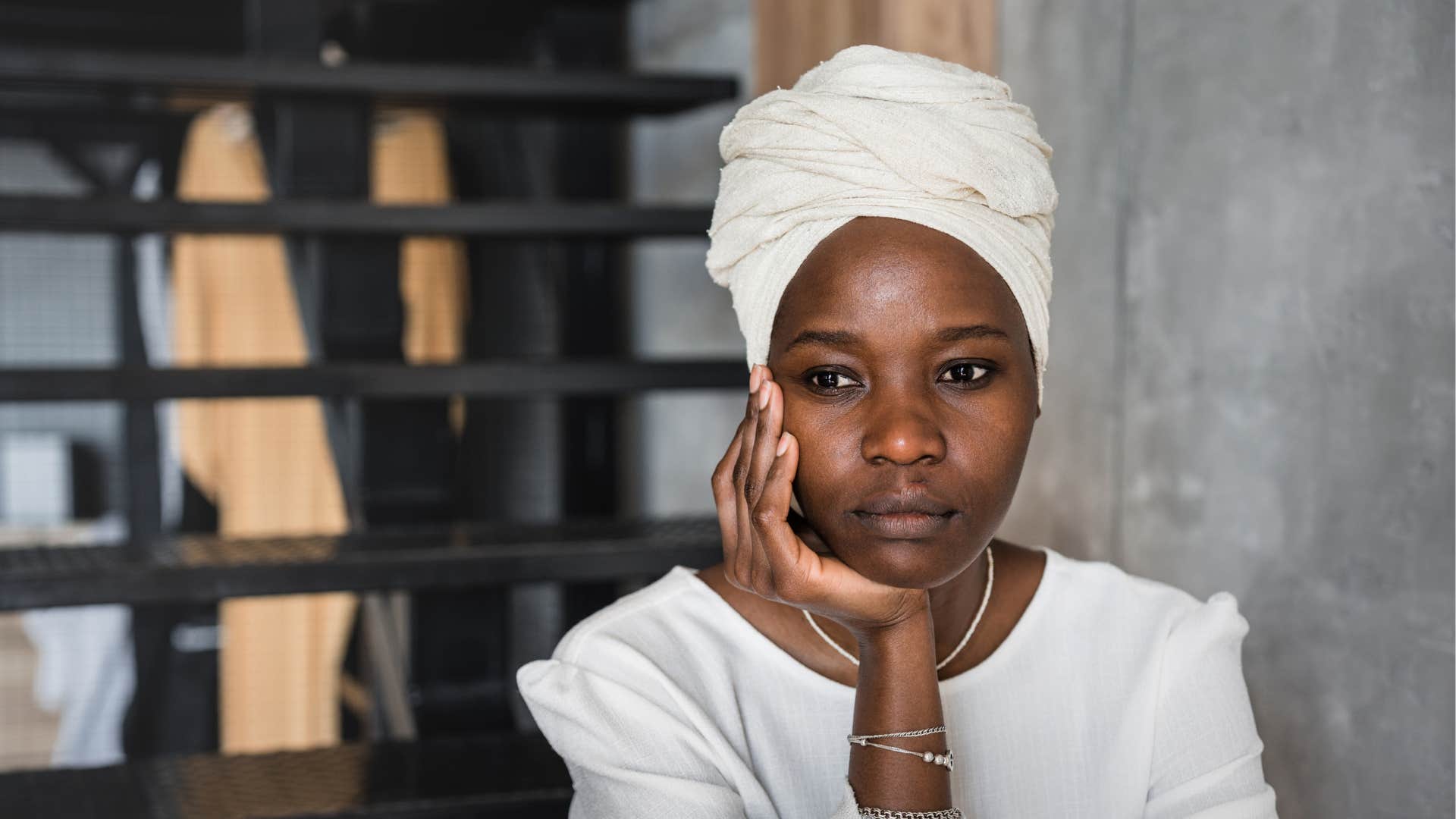11 Things People Say When They're On The Verge Of A Breakdown But Don't Want You To Know
These little details say so much more about a person than most people will ever know.
 Kateryna Hliznitsova | Canva
Kateryna Hliznitsova | Canva We often imagine a breakdown as something dramatic, tears spilling, angry outbursts, or someone shutting themselves away from the world. But more often, breakdowns happen quietly, behind smiles, busy schedules, and everyday conversation. People learn to mask their pain with words that sound ordinary, even reassuring, while inside they’re carrying a weight that feels unbearable.
The truth is, the signs are often hidden in plain sight. A person’s words may say, “I’m OK,” but their heart may be whispering something entirely different. By looking a little closer at the phrases we all use, you can begin to notice when someone you care about might actually be on the verge of a breakdown.
11 things people say when they're on the verge of a breakdown but don't want you to know:
1. 'I’m fine' — The Classic Mask
 iona didishvili via Shutterstock
iona didishvili via Shutterstock
On the surface, this is the ultimate brush-off, a quick reassurance that everything’s OK. But beneath it, “I’m fine” often means, “I’m anything but fine, but I don’t feel safe or worthy enough to let you in.”
It’s one of the most common emotional shields because it shuts down further questions while hiding deep vulnerability.
To get past this initial reaction, try asking a specific question instead. Try something like, "How is the tense situation with your brother going?" or "Have you made any headway with that work issue we discussed last week?"
2. 'I’m just tired' — The Exhausted One
 PeopleImages.com - Yuri A via Shutterstock
PeopleImages.com - Yuri A via Shutterstock
We all get tired, but when exhaustion becomes the default answer, it may be covering something more. Inside, it can mean, “I’m emotionally drained and holding myself together by a thread.”
It’s easier to say “tired” than to admit to overwhelm, hopelessness, or burnout. Research shows that fatigue may also be more than just a mask, it can also be a symptom of depression.
To work around this answer, try asking, "Where do you think your tiredness might be coming from?" to see if The Exhausted One will open up a little more.
3. 'I don’t want to bother you' — The Sacrificer
 fizkes via Shutterstock
fizkes via Shutterstock
What sounds considerate can really mean, “I don’t want to be needy, and I’m afraid of letting you down.”
This phrase is a burden belief that masks deep loneliness and self-doubt, making the person shrink back and forego help when they actually need support the most.
Instead of asking, "Is there any way I can help?" try being more specific. One example might be, "I'd like to drop by a slice of that pie you like from the cafe, would Monday night work?" or "I'd love to babysit for a few hours to give you some quiet time, if you'd like it. How about Tuesday?"
This type of question saves someone from the emotional work of having to come up with a way for you to help, and offering something specific makes it clear you truly do want to support them.
4. 'You’re amazing!' — The Complimenter
 MAYA LAB via Shutterstock
MAYA LAB via Shutterstock
Genuine compliments are beautiful, but when someone consistently pours out praise for others while never affirming themselves, it may be a disguise. Inside, they may be thinking, “I wish I felt even half as good about myself, and I wish you would say these things about me.”
These compliments can be a way to deflect attention and hide personal insecurity.
To get past this disguise, accept their compliment wholeheartedly, without feigning modesty, and then ask them what they think their biggest strengh is. Often, this can open up a more vulnerable, honest conversation with someone who is having a rough time.
5. 'I’ve got a lot going on, but I’ll manage' — The Stoic
 fizkes via Shutterstock
fizkes via Shutterstock
This phrase suggests resilience, but often conceals the truth: “I feel overwhelmed and close to breaking, but I don’t know how to ask for help.”
It’s a balancing act of wanting to appear capable while silently drowning under responsibilities. Just as I noted with The Sacrificer, above, offering something specific can help crack this veneer. You may also find success in saying something like, "I know you'll manage, but your well-being is important, too."
6. 'I just need to keep busy' — The Distractor
 KOTOIMAGES via Shutterstock
KOTOIMAGES via Shutterstock
Busyness can look like productivity, but it can also be an escape. Underneath is the fear, “If I stop moving, the weight of my feelings will catch up with me.”
Staying busy becomes a coping mechanism to avoid silence, stillness, and the pain that surfaces there. Unfortunately, stress and emotional pain don't actually disappear when we're distracted from them.
You can try any of the conversation-starters from above with The Distractor, but they may not work immediately. If not, you can be prepared for them to need you when all of those uncomfortable feelings come roaring back someday.
7. 'I don’t care' — The Dismisser
 Krakenimages.com via Shutterstock
Krakenimages.com via Shutterstock
Said with a shrug, this looks like indifference. But inside, it’s often the opposite: “I care so much that it hurts, and I’m shutting down to protect myself.”
It’s a wall built out of disappointment and self-protection. To crack through it, you could try saying something like, "I get it, but it would be totally normal and OK if you did care, too."
8. 'I’ll figure it out' — The Lone Wolf
 Chay_Tee via Shutterstock
Chay_Tee via Shutterstock
On the outside, it sounds confident and independent. But the unspoken truth may be, “I feel completely lost and terrified that I can’t fix this.”
It hides desperation behind the image of self-reliance, without the hint of self-pity that The Sacrificer can sometimes put forward.
To reach The Lone Wolf, try saying, "I know you will, but you don't have to do that alone." Then, suggest something you know will help or a time when you are available to talk or support.
9. 'I’m just being silly' — The Self-Dismisser
 WESTOCK PRODUCTIONS via Shutterstock
WESTOCK PRODUCTIONS via Shutterstock
Often said after admitting a fear or concern, this phrase minimizes their own feelings. Inside, it means, “I’m scared and hurting, but I’m afraid of being judged if I take this seriously.”
Humor and self-deprecation can be powerful masks for pain. It is common for comedians to discuss how they became "the funny one" to escape or distract from pain and even trauma. This phenomenon has even been supported by research.
To support The Self-Dismisser, recognize the mask when it comes up. Trust your instincts about what might be happening and don't let the humor fool you.
10. 'It could be worse' — The Minimizer
 Krakenimages.com via Shutterstock
Krakenimages.com via Shutterstock
This may look like gratitude, but more often it’s self-dismissal. The inner message is, “I’m minimizing my pain so you don’t see how bad it actually feels.”
While perspective can be helpful when someone is feeling down, comparing one’s pain to “worse” situations silences their own struggle. To break through this mask, try saying something like, "You're right, it could be worse. But that doesn't mean you aren't entitled to your feelings, too."
11. 'I just need some space' — The Withdrawer
 Ground Picture via Shutterstock
Ground Picture via Shutterstock
Space can be healthy, but sometimes it’s a coded plea. Inside, it may really mean, “I feel like I’m drowning, and I don’t know what I need. But, please don’t forget me.” It’s not rejection, it’s often the only way they know to cope.
When someone is on the verge of a breakdown, their words often tell only half the story. These common phrases are not lies. They are masks. Protective layers built from fear, shame, or exhaustion. They can sound so normal that we miss what’s really being said. Some of us say them silently inside, our self-talk keeping us separated from the healing sources we most need.
As I write this, I have just spent a week with a friend whose husband passed away 10 months prior after a five-year-long battle with colorectal cancer. She is not OK. She has not been OK for five years. But with 3 children, a thriving yet demanding non-profit business, and ultimately becoming her husband’s caregiver, she held and has continued to hold it together in front of everyone.
Her words, her shield; her face, her mask. She is the inspiration behind this article, as what you've just read became an in-depth conversation between us.
Each point prompted sighs of recognition, resolution, and mutual understanding. Perhaps you, too, may notice where you have been due to a challenging time in your life, or where you or someone you love may be now.
So what can you do? Pay attention. Notice the patterns, the tone, the energy behind the words. When you hear these phrases, instead of taking them at face value, gently lean in with curiosity and compassion. Sometimes the most healing response isn’t advice or solutions, but simply saying, “I’m here. You don’t have to go through this alone.”
Behind the mask, knowing they aren't alone is often exactly what someone needs to hear.
Ann Papayoti, PCC, is a relationship coach, author, speaker, and host of the podcast, Soul CPR Healing Out Loud. She helps people untangle from their past and heal their hearts.

